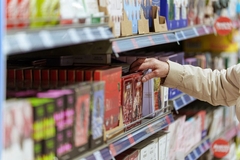
- Industry news
Industry news
- Category news
Category news
- Reports
- Key trends
- Multimedia
- Journal
- Events
- Suppliers
- Home
- Industry news
Industry news
- Category news
Category news
- Reports
- Key trends
- Multimedia
- Events
- Suppliers
First Ever Biodegradable Bag for Frozen Fruits and Vegetables Introduced by Oregon's Stahlbush Island Farms

Stahlbush and Cadillac Products Packaging Company believe packaging like the BioBag should become the norm, not the exception, in the frozen fruit and vegetable industry.
22 Apr 2010 --- Stahlbush Island Farms, a national leader in sustainable agriculture and food production, has launched the first-of-its-kind biodegradable bag for their frozen fruit and vegetable lines.
Consumers can now enjoy Stahlbush Island Farms frozen fruits and vegetables knowing when they dispose of the BioBag they will be helping the environment. This bag is designed to biodegrade in months, rather than the hundreds of years it takes standard polyethylene packaging to break down.
The BioBag is a result of two years of collaboration between Stahlbush and Cadillac Products Packaging Company of Troy, Michigan. Over the course of the project, a unique combination of manufacturing practices and processes with biodegradable materials allowed the BioBag to meet the necessary criteria to be a sustainable alternative to traditional flexible packaging.
A key challenge was to create a biodegradable bag that maintains a normal shelf life for the twenty different frozen fruit and vegetable product lines produced at Stahlbush Island Farms. This was achieved by leveraging the exclusive properties of the brown kraft paper used by Stahlbush for its packaging and the ink used on the BioBag, which is an innovative water-based technology.
Stahlbush and Cadillac Products Packaging Company believe packaging like the BioBag should become the norm, not the exception, in the frozen fruit and vegetable industry. To assist other companies in implementing more environmentally friendly packages like the BioBag, Stahlbush and Cadillac Products Packaging Company will share their experiences and innovative practices.
Stahlbush sees innovation as a key tool to improve soil, energy use, water, biodiversity, and food safety. The company is constantly looking for innovative ways to use technology and incorporate creative, sustainable ideas into its farming and business practices.










